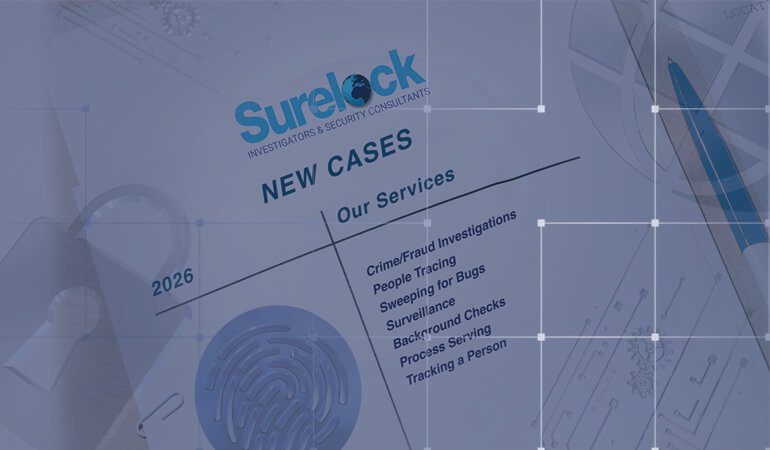Every year in the UK, businesses and individuals increasingly turn to a private investigator for help with everything from tracking missing persons to uncovering corporate fraud. In fact, recent industry research estimates that the UK investigation services sector will be worth around £1.2 billion in 2025.
So when you hear someone ask “Can I sue someone for hiring a private investigator in the UK?” you’re tapping into one of the hardest parts of balancing personal rights, privacy, and the law. In this article, we explain exactly when you might legally have the option to sue someone who’s hired a private investigator, and when you won’t.
Understanding the Law Around Private Investigators in the UK
Hiring a private investigator is perfectly legal in the UK, but what they can actually do is carefully controlled. Investigators must comply with strict privacy and data protection laws, including the Data Protection Act 2018, the Investigatory Powers Act 2016, and the UK General Data Protection Regulation (GDPR). These laws are designed to protect people’s privacy and prevent abuse of personal information.
A professional private investigator is trained to collect information within these boundaries. They might carry out surveillance in public places or check public records to find the facts a client needs. However, if either the client or the investigator ignores the law, it could become a legal matter. In some cases, you may have the right to sue for damages.
When You Can Sue Someone for Hiring a Private Investigator
You might be able to sue someone who hires a private investigator if they, or the investigator, have broken privacy laws or behaved unlawfully. Here are a few examples of when legal action may be justified.
Illegal Surveillance or Trespassing
Filming or recording someone on private property without their permission is a clear invasion of privacy. The same applies to placing hidden cameras in a person’s home or garden. Under UK law, trespassing and secret recording on private property can lead to civil action for invasion of privacy, or even criminal charges for harassment. If you find yourself in this situation, you may be entitled to sue the individual who hired the investigator, as well as the investigator themselves.
Hacking or Unauthorised Data Access
Accessing private data without consent is against the law. A private investigator has no legal right to hack into someone’s phone, email, or social media accounts. They also cannot view bank statements, medical files, or phone records unless authorised by the data owner or through a legal process. These actions fall under the Computer Misuse Act 1990 and can be treated as criminal offences. Victims can take civil action to sue for damages and report the matter to the police.
Harassment or Stalking
Persistent following, photographing, or contacting a person in a way that causes alarm or distress can count as harassment under the Protection from Harassment Act 1997. Even if the investigator claims to be gathering information, if their behaviour crosses this line, the client could be held responsible too. In such cases, you could sue for harassment and seek an injunction to stop the behaviour.
Defamation or False Accusations
If false information is spread about you as part of an investigation, and it damages your reputation, you may have a claim for defamation. This could include spreading rumours or making untrue statements that harm your personal or professional life.
What a Private Investigator Can Legally Do in the UK
Before deciding whether to sue, it helps to understand what a private investigator is actually allowed to do. Many people are surprised by how much of their work is completely legal when done properly.
A professional investigator can search public records such as property ownership registers, court documents, and company filings. They can conduct surveillance in public spaces, including following someone in a car or on foot, as long as it does not involve harassment or trespass. Investigators are also permitted to perform background checks for employers or solicitors and to help lawyers collect evidence for civil or criminal cases.
In short, if the investigator operates within the limits of UK law, there is no reason to sue the person who hired them. The work may feel intrusive, but it can still be entirely lawful if done correctly.
What to Do If You Think a Private Investigator Broke the Law
If you suspect that someone has hired a private investigator who has stepped outside legal boundaries, it is important to act calmly and sensibly. Start by keeping detailed notes of what has happened, including dates, times, and descriptions of any suspicious activity. Try to collect supporting evidence such as photographs, messages, or witness statements, but avoid confronting the investigator directly.
If you feel unsafe or believe you are being harassed, contact the police and explain the situation. You can also speak to a solicitor who specialises in privacy or harassment cases. They can advise you on whether you have grounds to sue and what type of legal action is appropriate.
If you believe your personal data has been collected or shared unlawfully, report the incident to the Information Commissioner’s Office (ICO). The ICO has the power to investigate and fine anyone who breaches data protection laws.
How to Protect Yourself from Unlawful Surveillance
If you think you are being watched or followed, there are practical steps you can take to protect yourself. Check your vehicle for GPS devices, as it is only legal to track a vehicle with the owner’s consent. Make sure your online accounts and mobile devices are secured with strong passwords and two-step verification. Limit what you post on social media, as personal details shared online can be used to track or monitor you.
If you continue to feel targeted, seek legal advice. A solicitor can help you assess whether the activity is unlawful and guide you through the process of making a formal complaint or pursuing a claim.
FAQs About Private Investigators
Can I sue a private investigator directly?
Yes, you can sue a private investigator if they personally break the law, such as hacking, trespassing, or harassing you. In many cases, you can also take legal action against the person who hired them if they encouraged the behaviour.
Is hiring a private investigator legal in the UK?
Yes, it is completely legal to hire a private investigator in the UK as long as they operate within privacy and data protection laws.
Can a private investigator follow me?
A private investigator can follow someone in public places, but if the surveillance becomes excessive or threatening, it can be classed as harassment. In that case, you may have grounds to sue.
Can a private investigator record my phone calls?
No, recording private conversations or phone calls without consent is a breach of UK law. Evidence gathered in this way would not be valid in court, and you could take legal action.
What if I feel unsafe because of a private investigator?
If you feel at risk or harassed, contact the police immediately. Keep records of all incidents and seek advice from a solicitor who can help you understand your legal options.
Conclusion: Understanding the Legal Side of Private Investigator Hire
In conclusion, private investigator hire is lawful in the UK when handled properly and within the limits of the law. You have the right to sue someone who hires an investigator if your privacy has been invaded, your personal data has been misused, or you have been harassed. However, when a private investigator follows professional standards and stays within legal boundaries, their work is entirely legitimate.
Understanding the difference between legal and illegal investigative activity can help you protect your rights and respond confidently if you believe someone has overstepped.
If you ever need to hire a private investigator or seek advice on a potential privacy breach, contact Surelock. The team provides confidential and fully compliant investigative services across the UK, conducted with integrity and respect for the law.

.webp)




